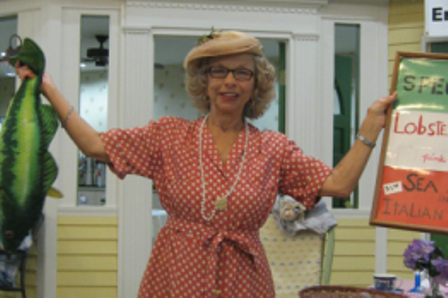
WTI Magazine #52 2015 January, 23
Author : Laura Bellusci Translation by:
The Original Mrs Drinkwater Presents is a one-woman show, a comedy about family and friends set in Boston's Little Italy in the 1950's. Laura Bellusci, creator and performer, portrays Josie Drinkwater as a feisty, outgoing lady who goes "gallivanting around" town dispensing her unique form of "uncommon sense". When we meet Josie, she's widowed and lives with her daughter, Lana, and son-in-law, Dr. Bossone.
Characters include Josie's friend, and mirror image, Connie Bevilacqua, widow of Luigi who "got to keep his name"; the ladies at Muriel's House of Beauty; Vinny Capra, "the old goat", and many others she meets "up the square".
Background:
"Mrs Drinkwater" came to life five years ago in a writer's workshop; in time, the character became a way to write about my grandmother, Giuseppina Iannini. Most of the characters and scenarios are fictitious, but imbedded in each is a kernel of truth that belongs to the original Josie.
I grew up in East Boston in the 1950's and my characters use the lingo of that time. I perform in diverse venues across New England and parts of New York and don't often use dialect, Italiese, or expressions left behind from other immigrant groups.
Like my grandmother, Mrs Drinkwater "was born in Boston's North End...right next door to Paul Revere's house... the only one of folks my age born in this here country ....That's because my mother, God rest her soul, was heavy with me when she got on the boat in Naples. Dio, can you imagine being down in the bottom of the boat, with the belly... and the waves. Oo-fa, thank God I wasn't born out there in the ocean, then what would I be?"
How I loved their stories of emigration to L'America.
In my father's opinion, all people called Drinkwater were originally Bevilacqua. Chi sa? But it makes a good intro as Josie's late husband, Armand, gets his named changed at Elllis Island. Josie's daughter Lana fits the first generation stereotype caught in the cultural divide, wanting more of the "American dream". She comes across as a heavy-hitting social-climber, somewhat frustrated with maintaining the status-quo and her duty to tradition.
As second generation I continue to explore the Italian-American immigrant experience, and my place in it: A complex legacy, rich in the art of story-telling, politics/satire, argument and opposition to the powers that be, earthly and heavenly; Enrico Caruso's booming tenor on the Victrola; war stories of returning uncles and the shame of cousins fighting kin – un abbondanza of food and the vagaries of language.
Josie, my muse, draws from this heritage and breathes life into the stories I'm so fortunate to share.



